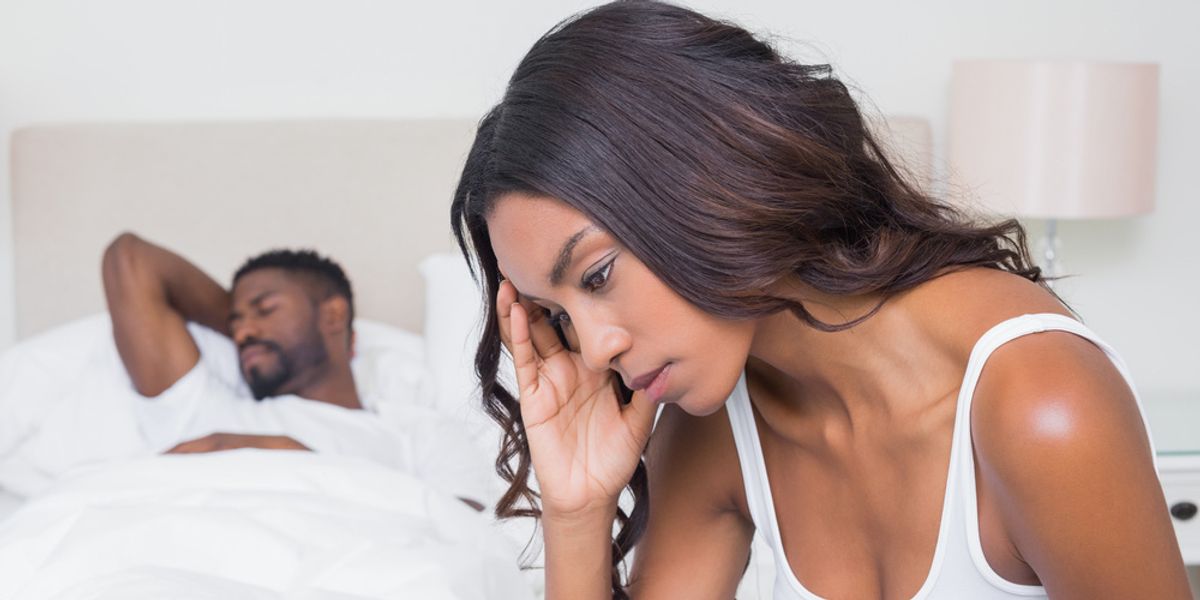
How Mental Health Impacts Sex, According To Sexual Wellness Professionals
I don't know about you ladies, but when I'm not in the mood, she's not in the mood - and when I say she, I mean my treasure box. There have been countless occasions where I've wanted to be intimate with my boyfriend, but I couldn't just seem to bring myself to do it. Sometimes, I'm completely out of it and don't even want to be touched. It's not that I don't want to, but sometimes I don't want to - it may not make sense reading it, but ladies, you know what I mean, right?
During my depression spells, I usually don't want so much as an arm to be around me and the idea of sexual activity doesn't turn me on as much as it usually does. When I'm stressed out and my anxiety levels are to the roof, the last thing on my mind is to relieve my stress with body-to-body meetings with my boyfriend; and that's OK, too.
Throughout the duration of my depression spells and anxiety attacks during my stay here in quarantine with my boyfriend, we haven't been exactly getting to know each other more in the physical sense. It's not that I am not attracted to him or don't want to be intimate, but my desire for sexual pleasure is compromised and I don't feel my sexiest when my mind is elsewhere and I feel like I'm not even in control of my own body. In order to help combat the stigma surrounding sex and its relationship with mental health, I spoke with sex educators, bloggers and mental health professionals.
How Does Your Mental Health Affect Your Sex Life
Mental Health, Sex & Intimacy

Shutterstock
"Mental health is key in arousal and libido. If there is instability with arousal, there is often an effect in libido. When anxiety, depression, or stress is high, libido can often disappear," explains Dr. Lexx Brown-James, CEO of The Institute for Sexuality and Intimacy, LLC. Mental health is an integral part of physical health and the central nervous system (CNS). When our mental health is compromised, our physical and emotional health follows, which translates into sexual activity, or lack thereof, and our inability to connect emotionally and sexually with our partners.
"When your mental health is off, it can be harder to desire sexual intimacy at all with your partner," sex educator and blexApp coach Tatyannah King states about the impact on your sexuality and confidence during the decline of your mental health. "This can create emotional and sexual distance between couples because someone may feel like their partner isn't attracted to them anymore whereas the person whose mental health is struggling truly finds it hard to stay present because their mind is preoccupied with the many things that are making them feel anxious."
Managing Medication Side Effects, Lower Sex Drive & Sexual Dysfunction

Shutterstock
For some of us, mental health is managed through medication and traditional medicine. However, sometimes medication can have a negative side effect on intimacy and connectivity. "Some medication can cause a decrease in libido and affect the length of time it takes to be aroused, making it take longer to get aroused and hard to reach any type of desired orgasm," Dr. Lexx Brown-James adds in.
When life stressors cause distress in our physical health and are managed through prescription medication, sexual wellness can be compromised and not-so-positively affected. "Medications can be disruptive to a woman's level of sexual arousal triggering reduced vaginal lubrication thus resulting in associated pain with sex. Negative side effects of medication will influence an individual's mood swings, reduce sexual desire, lower libido, eliminate sex drive or desire to orgasm," sex eduator, blexApp coach, and founder of pauseWHAT? Robyn Harris says about the negative sexual side effects and emotions that are often paired with medication.
"Medication induced sexual dysfunctions can lead to feelings of embarrassment, severe anxiety, emotional alienation and personal distress," Robyn continues. "If intimacy and sex connectivity issues develop through the use of medication, visit your doctor and be openly candid about your concerns."
Stigmas and Sexually Liberated Women

Shutterstock
Like Estelle once said, "I can be a freak every day of every week," and I have no shame in my game. Women are oftentimes shamed for being naturally sexually beings and labeled as "promiscuous", "too sexy" or "thirsty". "There are countless negative stigmas against women that take control of their sexuality," starts certified sex educator Irma G. "Purity culture that stresses virginity until marriage and the idea of one's worth being reduced if premarital sex was had, and even more so when one has had multiple sex partners. You're basically a Jezebel at that point - but I would like to point out that there is absolutely nothing wrong with being a Jezebel," Irma exclaims. "Hell, I'm one!"
From catcalling to slut-shaming and rape culture, the community enhances the notion of women "asking for it" by wearing "revealing" clothing and embracing their sexuality when sexually assaulted or harassed, anywhere between the workplace to a nightclub and within their own homes. Even those who are deemed as anything set apart from the heteronormative standard is put more at risk due to their occupation, sexual orientation, gender identifcation or gender performance. "Sex workers and trans-women are seen as people with no value due to either their job in sexuality or for their identity," Irma adds. "This causes violence against them to rise and for rape culture to respond with 'they asked for it' or 'they shouldn't have been doing that'.These groups are seen as less-deserving of respect for simply existing or making a living."
Talk To Me Nice

Shutterstock
OK, so we all remember that awkward "Birds and the Bees" talk we got about how sex works when we were younger, right? While that may have been a good breakdown for the youngins to destroy the myth about the stork dropping off our children like the United States Postal Service, we as a society need to be held accountable for driving positive conversation about the relationship between mental health and sex. "There are still massive taboos between mental health and sexual wellness, which is dangerous considering how interconnected the two are," explains writer, sex educator and podcaster Cameron Glover. "I've written about the need for us to have more conversations about how the two are interconnected before, but it bears repeating that we can't keep the two separate. Sexual wellness is part of wellness, and if we're shying away from much-needed, solution-driven conversations on how people can navigate it safely because we're afraid of touching on 'taboo' or uncomfortable topics, then we're doing a massive disservice to our communities."
"It's also important that sexuality professionals are brought forward into spaces where health and wellness are being discussed, and not just pigeonholed to talking about sex in connection to pleasure and anatomy," the Sex Ed in Color Podcast host shares. "These topics are important, but if we want to move forward with integrating sexual wellness and mental health, sex educators need to be brought into spaces where both are being discussed."
Masturbation, Self-Love and Mental Health

Shutterstock
Everyone needs a bit of self-love, but I don't mean the spa day and glass of Chardonnay. I'm talking about self-love in a physical, seductive, natural way called masturabation. Masturbation oftentimes has a negative connotation to it that it's shameful, sinful or just downright nasty - but that's not the case at all. "Masturbation has been shown to have many mental health benefits. Masturbation may increase sexual desire and feelings of pleasure and satisfaction, improve mood, promote relaxation, relieve stress and anxiety, ease stress-related tension, and improve sleep," says Dr. Wendasha Jenkins Hall about the positive side effects of masturbation.
The women's sexual health and wellness researcher and educator continues to shed light upon the relationship between mental illnesses and masturbation. "However, masturbation is often associated with anxiety and depression. It has not been shown to cause depression or anxiety, but masturbation can exacerbate them in some people. Typically, it's our cultural, religious, or personal norms and convictions around sex and self-pleasure that can lead to feelings of guilt and shame, especially if we're taught to view sex in a negative light. If this is the case, a person may experience depression or anxiety after masturbating, or having sex in general."
She later adds that though rare, some people believe that an addiction to masturbation is possible in some people, which can then become problematic if it interferes with one's daily life, relationships, and responsibilities.
Any Advice?

Shutterstock
Oftentimes when I don't want to have sex, it's because my stress levels and anxiety are all over the place and my yoni can't stand the pressure of it all. As your mental health fluctuates, so can your libido and it's important to listen to the needs of your body as it ebbs and flows with your mental wellness. "I would encourage people first to listen to their bodies. While things like frequency or length of sex might feel important, resist the urge to try and shame or judge your body into behaving differently; spoiler alert – it likely won't work. Instead, center pleasure," advises Shadeen Francis, LMFT.
"What would feel good to you? Is there any way you could connect to your body that could feel pleasurable or satisfying?"
The sex and relationship therapist shares with xoNecole. "Examples might be sitting in the sun, getting spanked, taking time to lotion your skin, laying under a heavy blanket, or being tickled. Communicate with your sexual partner [or partners] about what is happening, what kind of support you need, and what kinds of play you're available for. It is not unusual for partners to be surprised, disappointed, or even frustrated by the changes, however mental health is health, and nobody should be shamed or judged for being unwell."
Featured image by Shutterstock
- How Black Women Are Putting Their Mental Health First - xoNecole ... ›
- Express What Your Sexual Needs Are Now - xoNecole: Women's ... ›
- Is Your Job Affecting Your Sex Life - xoNecole: Women's Interest ... ›
- 5 Ways To Put Your Mental Health First - xoNecole: Women's ... ›
- Ever Wonder If Your Vagina Is Stressed TF Out? - xoNecole: Women's Interest, Love, Wellness, Beauty ›
- How To Communicate Sexually - xoNecole: Women's Interest, Love, Wellness, Beauty ›
- How Your Man Can Adjust To Your "Sexual Growth Spurts" - xoNecole: Women's Interest, Love, Wellness, Beauty ›
ItGirl 100 Honors Black Women Who Create Culture & Put On For Their Cities
As they say, create the change you want to see in this world, besties. That’s why xoNecole linked up with Hyundai for the inaugural ItGirl 100 List, a celebration of 100 Genzennial women who aren’t afraid to pull up their own seats to the table. Across regions and industries, these women embody the essence of discovering self-value through purpose, honey! They're fierce, they’re ultra-creative, and we know they make their cities proud.
VIEW THE FULL ITGIRL 100 LIST HERE.
Don’t forget to also check out the ItGirl Directory, featuring 50 Black-woman-owned marketing and branding agencies, photographers and videographers, publicists, and more.
THE ITGIRL MEMO

I. An ItGirl puts on for her city and masters her self-worth through purpose.
II. An ItGirl celebrates all the things that make her unique.
III. An ItGirl empowers others to become the best versions of themselves.
IV. An ItGirl leads by example, inspiring others through her actions and integrity.
V. An ItGirl paves the way for authenticity and diversity in all aspects of life.
VI. An ItGirl uses the power of her voice to advocate for positive change in the world.
Let’s make things inbox official! Sign up for the xoNecole newsletter for daily love, wellness, career, and exclusive content delivered straight to your inbox.
Navigating Dating When Emotionally Unavailable & Detached: My Journey Back To Feeling
The last time I came with a dating story, I told you I got my little feelings hurt in 2021. I called myself trying to be out in these streets entertaining a man in a different area code, city, and state — only for homeboy to play in my damn face. So, I went and gave y’all "8 Rules To Casual Dating Every Woman Should Know This Summer." You’re welcome. Fast forward to 2024, and I am now coming to you from a more mature and intentional place. We’re not in summer yet, but I truly believe what blooms in spring, thrives in summer.
2023 was my year, and it was my turn. I had just completed an 8-month holistic detox. The glow-up was real and well-deserved. The way I have poured into myself is unmatched. Let me tell you, self-love is a love you have never known. After a five-year healing journey, I finally felt like myself again, and I was ready to play. My heart was open, my mind was clear, and my body hella transformed. I had told all my friends that I was ready to explore dating again, and at the height of summer, I did exactly just that.
This time I decided I wanted to take my time. I wanted to date the “right way” or the “healthy way.” You know, keep your options open, ask the right questions, believe actions and not words, observe patterns and pay attention to red, yellow, and green flags. I was never the dating app type of girl. I sincerely miss everything about human connection and dating from 2000 to 2012. Can we please bring all of that back into 2024? I prefer to feel a man’s energy and presence in real-time. Nonetheless, I still chose to dabble with a few dating apps. I was all the way outside and dating for practice.
Unfortunately, with today’s dating culture, social climate, and how some of these men move and/or behave, these dates were a dead end. Not one guy made it to my roster. What these men were was benched this season – not one of them could be my first-round select draft pick. It didn't seem like anyone I met was interested in a serious relationship. And it’s completely fine. Miss me with the ghosting, lack of effort, inconsistency, and poor communication. I continued to just do me because what is for me will not miss me.

Kelvin Murray/ Getty Images
The universe must have heard me talking because I had specifically told my closest girlfriends that I wanted to meet someone who lived in the vicinity, no more than twenty minutes away, and no more long distance. And I did meet him (it’s crazy how I manifest exactly what I want). As we started to get to know each other, I liked his energy and effort. I liked the direction it seemed to be going to the point my girlfriends had to tell me not to run from him. Because every part of me wanted to run from something that seemed normal.
I liked what he was coming with until I became uncomfortable with my own feelings, and I didn’t know how to communicate them to him.
With that said, I knew if I truly wanted to experience the truest of loves, a reciprocal, requited love, and be in a healthy relationship this story had to come to a pause. What I didn’t know was that he was going to show me things I didn’t know I needed to work on. I didn’t know he inadvertently was going to help me continue to heal parts of me that were hidden.
As someone who has learned to self-heal, I am no longer the type that runs from herself. I am here for the growth.
The truth is I am emotionally detached from myself, and I am not actively dating at the moment. I am the one that has to work on herself. My reiki healer called it, too – she told me this year would not be a year for a relationship, but a year of continuous growth. And now I see why. After all the healing work I have done thus far – I am an unemotional mess. How?
At my big age of 39, I struggle to communicate my wants and needs.
I still struggle to communicate and process uncomfortable feelings. I would rather give myself anxiety, act nonchalantly, emotionally react, and choose non-communication when I am bothered with someone than address the issue (I will later explain why). I have been ignoring my feelings for so long it has become a habit, a defense mechanism, and more so a trauma response.
If you are someone like me who grew up in a household that didn’t discuss feelings, your emotional needs were unmet, and you don’t feel safe to share your feelings – emotional detachment is quite common.
Oftentimes, we always talk about men being emotionally unavailable, but what if it’s a woman who is emotionally unavailable or emotionally detached? How does she navigate herself, dating, or being in a relationship? As I navigate my emotions this season, let’s explore what it means to be emotionally detached, the signs of detachment, and how to reconnect with yourself emotionally.
Emotional Unavailability vs. Emotional Detachment
When we look at the terminology emotional unavailability and emotional detachment, one might argue that the two terms are interchangeable and have the same meaning. One could also argue that both terms mean that some people are not in tune with their emotions or lack the emotional capacity to be responsive to someone else’s emotions. Fair enough. However, there is a big difference. The definition of emotional unavailability is described as people who have difficulty with sharing their emotions and being receptive to the emotions of those around them.
According to Verywell Mind, signs of emotional unavailability can look like being distant or cold, lack of closeness, and emotional intimacy in relationships, inability to understand and relate to others’ feelings, defensiveness when asked to change or let others in, tendency to shut down or avoid topics that require emotional openness, or withdrawal from people or situations that provoke emotional reactions.
 GIF by Kim's ConvenienceGiphy
GIF by Kim's ConvenienceGiphyWhereas emotional detachment is defined as the inability to or willingness to connect with others on an emotional level. Furthermore, Psychology Today states emotional detachment can also mean that people do not engage with their feelings. Exhibit A – me. Emotional detachment has various causes – past neglect, childhood or adult trauma, PTSD, depression, personality disorder, bipolar disorder, substance abuse, or, in some cases, medication (i.e. antidepressants). It is important to note emotional detachment is a complex issue. For someone like me, it’s a coping mechanism.
It is easier for me to ignore uncomfortable feelings to protect myself from stress or getting hurt. Hence, my nonchalant demeanor. It is also true for some people it is a reaction to trauma, abuse, and unprocessed emotions. Exhibit B – me. As it is difficult for me to open up about my feelings at the moment. On the contrary – emotional detachment can be helpful in navigating some situations like listening to people’s opinions and gossip.
Unfortunately, emotional detachment is not a behavior that can be turned on and off at will. Please note that emotional detachment is NOT a mental health diagnosis but can be a symptom of a mental health condition such as an attachment disorder. And if you know anything about attachment theory, it is related to the relationship we develop in our childhood with our primary caregivers.
Signs You're Emotionally Detached

Mavocado/ Getty Images
According to Psychology Today and Verywell Mind, general signs of emotional detachment can look like difficulty showing empathy to others, sharing emotions, committing to a relationship, feeling numb, poor listening skills, lack of self-esteem, preferring to be alone, struggling to feel positive emotions, inability to identify emotions, lack of physical, verbal, or sexual contact and losing touch with people or maintaining connections.
In a romantic relationship, emotional detachment shows up as you or your partner not being available for connection, poor communication, or reduced affection.
For me, my experience with emotional detachment is collective. I am an empath to my core. I don’t have a problem relating to other’s feelings or circumstances. I don’t have commitment issues, nor do I have an issue connecting with others or maintaining those connections. I struggle with sharing emotions, at least the negative ones.
Due to the emotional abuse from my childhood and a toxic relationship, I learned sharing emotions just wasn't the safe thing to do. As a survivor of trauma, I learned to suppress feeling negative emotions in general as a form of protection.
How To Reconnect To Your Emotions When You're Emotionally Unavailable
 Serious Kid Cudi GIF by Apple MusicGiphy
Serious Kid Cudi GIF by Apple MusicGiphyExploring my emotional side in-depth started late last year simply by noticing my reaction to something that he did. I didn’t know how to properly communicate to him how I was feeling or what he did bothered me in the moment. So, I swallowed my feelings and said absolutely nothing. I intentionally chose to avoid the issue. I chose to rationalize the situation instead of acknowledging that my feelings at the time were valid. I chose to act like everything was all good because it was all good.
“It wasn’t that deep to begin with” is what I told myself. And this is where the problem lies.
The saying is true, “What happens in your childhood shows up in your adult relationships.” I came to realize that because I was not able to express my feelings as a child, I struggled to process them. I either hold back my feelings, take a long time to say how I feel, or don’t say anything at all. This is because I fear people will walk away from me like my mother did if I share what I truly feel. I fear my feelings won’t be validated, or they will be rejected.
With that said, I was completely unaware that I was emotionally detached from myself until recently. So, here we are with this article. It all started by reading Instagram’s @theholisticpsychologist, Dr. Nicole LePera’s newest book How to Be the Love You Seek: Break Cycles, Find Peace, and Heal Your Relationships, which was released on November 28, 2023. As I read through the first chapter, I became triggered.
How Dr. LePera describes her childhood with her parents and experiences with her romantic partners somewhat mirrored my experiences with my own parents and relationships. As Dr. LaPera stated in her book, I have no issue showing up for others or meeting their needs and wants. But when it comes to expressing my own needs and wants – I cannot or I don’t. This is mainly due to my hyper-independence.
At an early age, I learned to show up for myself because the people I trusted to show up for me failed. Given my home environment, I had internalized it is not safe to talk about feelings. I never knew my emotional responses and behavior were abnormal. But because I am willing to continue to do my inner work, I know that I can reconnect to my emotions, and undo four decades of repressed emotions.
If you are someone like me who struggles with emotional connection with yourself and others, here is how you go about it:

Lighthouse Films/ Getty Images
1. Know Your Attachment Style
For me, the first step was to understand my attachment style. I asked my therapist if she could help me identify my attachment style to understand my triggers. She recommended The Attachment Theory Workbook by Annie Chen, LMFT. My therapist administered the associated online quiz – Attachment Quiz. If you haven’t figured out my attachment style yet by reading this article, I have an anxious attachment style.
This means I don’t do well with inconsistent behavior, especially from men (but I’m the type that holds men to standards too). People with an anxious attachment style have a need to feel close to their partner. It may come across as “clingy” or “needy.” However, this same need is often driven by fear of abandonment, mistrust, and low self-esteem. I would say knowing your attachment style is helpful because you can work towards having a secure attachment style (with practice) in your relationships – familial, business, work, platonic, or romantic.
2. Become Self-Aware
Most people who are not in the practice of self-care or self-healing are unaware of their triggers, patterns, and behaviors. We are so caught up in the daily minutiae of life that we forget to pay attention to the most important part of our days — ourselves. As Dr. LePera says, make it a conscious habit to pause throughout your day to check in with yourself. Ask yourself:
- How does my body feel?
- What am I doing right now?
- Am I present?
- Am I distracted and lost with other thoughts?
- What do I think or feel when I recall a specific experience with someone?
- What do I think or worry about?
- What would happen if I shared my authentic thoughts, perspective, feelings right now?”
This is what Dr. LePera refers to as exploring your embodied self or fulfilling your authentic needs in chapter two of her book. Consistent mindfulness and self-awareness are key to self-discovery and in any healing journey. Learning to focus on the present moment also includes paying attention to our emotional response to an event or how we think about emotions in general.
3. Practice Vulnerability
The idea of vulnerability is a tough one for me and so many other women for countless reasons. Whether it be toxic family, friendships, relationships, or trauma – trusting others with your thoughts and feelings is not easy. As much as I am open and transparent, I am not as vulnerable. And I believe there is so much power in the duality to be both. To trust someone, let alone a man with your authentic self is a delicate matter.
But it is emotional vulnerability that allows us humans to build authentic connections, create stronger relationships, and break down emotional walls. Emotional vulnerability is not something to be rushed – it takes time and practice from you and the people you choose to have in your life. Medical News Today suggests that we can learn to be vulnerable by opening up more to our closest friends, building our ability to become more trusting, and developing skills to regulate our emotions.
4. Seek Therapy
I have been in therapy for six years and counting. I would consider therapy one of my safe spaces. I am one of those individuals who recommend therapy to everyone as it has given me the tools and resources I need to navigate my life challenges. By choosing to get help, I was able to put my PTSD and depression in remission for four years now. I have also learned how to manage my anxiety.
I am fully aware that in this season of my life requires me to do the work to unlock new levels of self. And any time where I have consciously chosen growth – the universe or life has not failed me. I was able to heal my body, my heart, and my spirit. Now, it’s time to heal my inner child, this hurt little girl who lives in me.
I will say choosing a therapist is similar to dating; you might go through a few potentials until you find a therapist you connect with. Actually, one of my lifelong friends said to me the other day, “Your relationship with your therapist is one of the most important relationships in your life.” I needed her to say that, and I needed to hear it because it’s true. You are essentially trusting a licensed stranger to help you navigate your life on so many levels.
Be picky and ask the questions. Cut the cord at the first red flag given. Again, let me reiterate that emotional detachment is not a mental health diagnosis. It can be treated with the help of a therapist. Emotional detachment only becomes a problem when it starts to interfere with your daily life. Pay attention to changes in your daily behavior and make decisions to cope accordingly.
I am genuinely excited about reconnecting with my emotions. I want to feel all the feels – good, bad, and indifferent. I want to cry all the tears – especially the sad ones. I want to process and release negative emotions. I want to say how I feel in the moment with no fear.
If you are that girl who struggles with emotional connection or thinks you're emotionally detached, I hope that you become willing to face your inner child and show up for her. Don’t run – she has been waiting for you.
Let’s make things inbox official! Sign up for the xoNecole newsletter for daily love, wellness, career, and exclusive content delivered straight to your inbox.
Feature image by fizkes/ Getty Images









